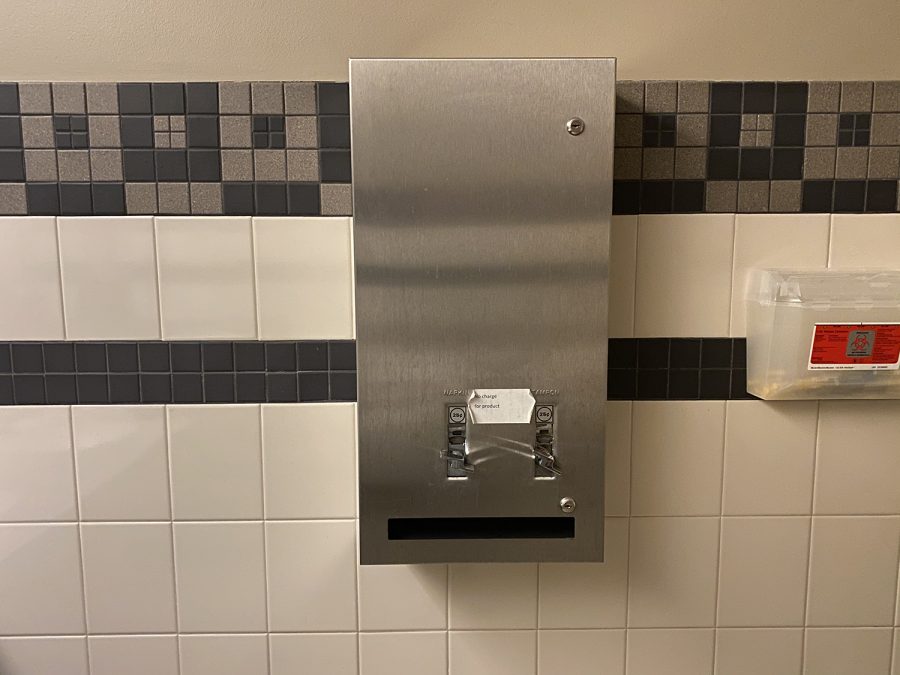Iowa senators aim to address accessibility of menstrual products in state-run buildings with proposed bill
Two bills proposed by Democrats in the Iowa Senate are attempting to increase the accessibility of menstrual products.
A feminine-hygiene products dispenser is seen in a bathroom in the Adler Journalism Building on Jan. 24, 2020.
February 17, 2020
Facing a Friday funnel deadline to advance, one bill sitting in the Iowa Senate aims to mandate menstrual products to be available at no cost in all state buildings — including state institutions such as the University of Iowa.
Senate File 2039 proposes that menstrual products are available at no cost in any building owned, leased, or operated by or under the control of the state government, a state agency, the state department of transportation, the state Board of Regents, or the Iowa State Fair board.
Because the bill involves regent institutions, it would mandate tampons and period pads be provided in restrooms at the University of Iowa and its peer institutions in the state. Since Jan. 17, the regents have registered as “undecided” on the bill, meaning they haven’t taken a position for or against the bill.
“The Board of Regents is monitoring the bill,” regent spokesman Josh Lehman said in an email to The Daily Iowan on Jan. 23. “[We] will follow the language of the bill as it moves through the legislative process.”
UI Student Government Health and Safety Committee Co-Chair Avery Brennan said Jan. 29 he approved of the idea, and that a similar initiative existed within UISG not too long ago.
“We already have dispensers in many buildings on campus anyway,” Brennan said. “All we would need is more funding … I was trying to pursue something like this a year ago in student government and I was pushing for better menstrual products on campus. People have complained about applicators and discomfort.”
RELATED: Iowa startup aims to break down stigma surrounding periods
The bill, backed by 16 Democrats in the Iowa Senate, comes at the same time that Iowa Gov. Kim Reynolds, a Republican, is advocating for a list of tax reforms in her “Invest in Iowa Act,” which includes removing feminine-hygiene products such as tampons and period pads from the list of products subject to a sales tax. However, Reynolds hasn’t yet come out in support of the separate bill that would require state-building bathrooms to be stocked with menstrual products.
Reynolds’ Communications Director Pat Garrett said in an email to the DI the governor will wait to comment on the bill until it’s farther along in the legislative process.
“The governor will wait to weigh in on this legislation when she can see it in its final form,” he said in the email.
Currently, the bill awaits a subcommittee meeting to evaluate the proposal. Then, the bill must clear the hurdle of passing the full Human Resources Committee in order to survive past a mid-session funneling deadline on Friday.
Iowa Sen. Claire Celsi, D-West Des Moines, is one of the sponsors of this legislation as well as sponsoring Senate File 173, which would exempt feminine-hygiene products and diapers from a sales tax.
Reynolds’ tax proposal would remove the luxury tax also, but it doesn’t create a provision for Regents to provide menstrual products in their buildings.
She said the accessibility of these necessary products is a problem, especially for low-income women and female students in Iowa. Increased accessibility is the overall goal of each of these bills, Celsi said in a phone interview Jan. 22.
“The premise that a menstrual product is an option or a luxury item is laughable to any woman who has ever needed one,” Celsi said. “It’s taxed as a luxury product when it needs to be put in the same category as things like food. The [state building] piece is about equity and convenience. [We] need to ensure that everyone who needs these products has access, regardless of socioeconomic status. These products should be readily available.”
RELATED: UI saves nearly $30,000 on tampons
The DI also reached out to multiple Republican senators on the Iowa Senate Human Resources Committee, including Mark Segebart, Annette Sweeney, Jim Carlin, and Craig Johnson, but none responded to requests for comment.
Regardless of pending decisions by lawmakers, Brennan said this legislation is important, especially for UI students. He said it is especially important for low-income or first-year students who may have limited accessibility to menstrual products while on campus.
“I know there are different socioeconomic groups on campus,” he said. “For some people this may not be a concern, but for others it is. If the regents can afford these changes, or it can be put in bills to provide [menstrual products], I think it would help a lot of people.”






